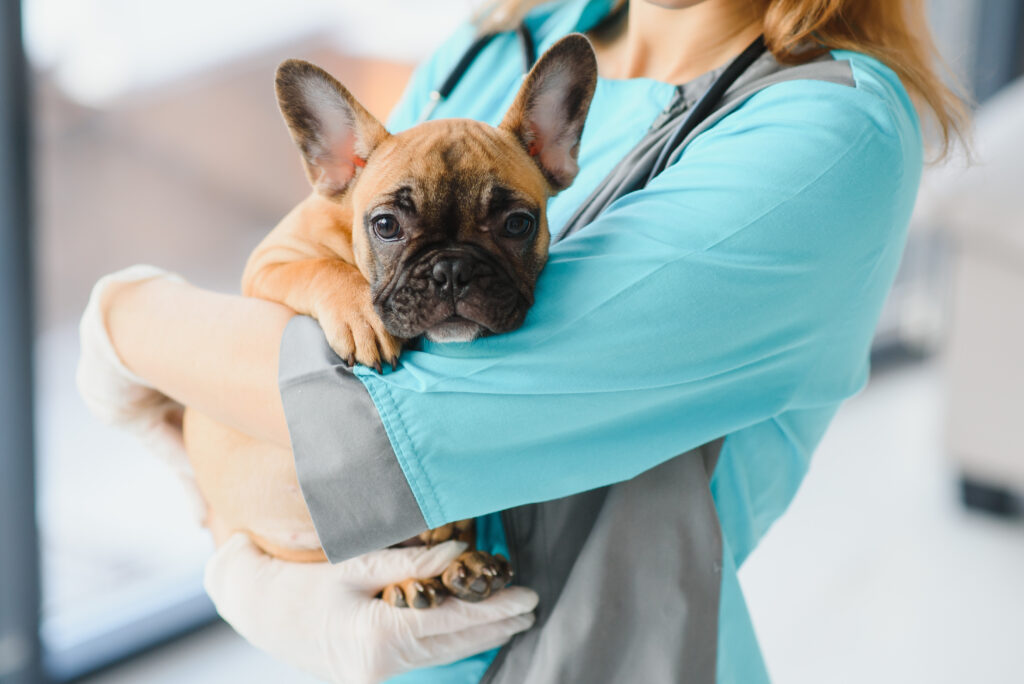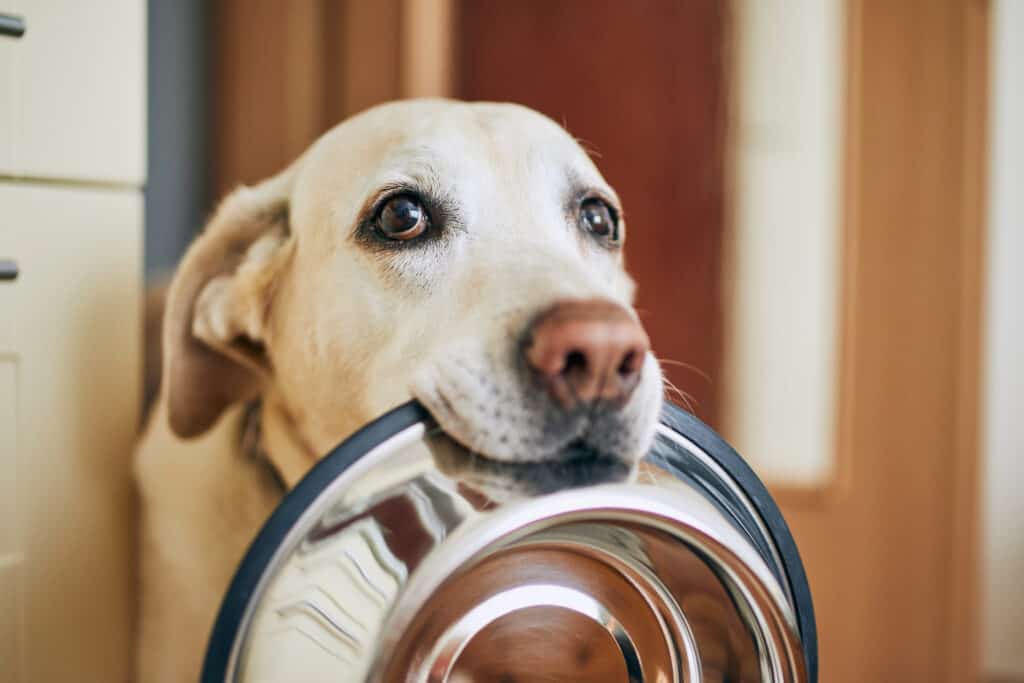Activated charcoal is a tool common in medicine. It helps with issues ranging from teeth staining to GI upset. Some pet parents wonder if it could possibly help our canine companions. Activated charcoal for dogs can be lifesaving. It can help if a pup has ingested a toxin. However, you must follow specific guidelines to ensure your pup’s safety. We want you to have all the information needed to best help your dog! We dive into everything you need to know below. Let’s get started!
What Is Activated Charcoal?

Activated charcoal is negatively charged due to its porous texture, which allows it to bind to any positively charged toxins or gases in the GI tract.
©Hryshchyshen Serhii/Shutterstock.com
What is activated charcoal? Activated charcoal is a form of charcoal treated with oxygen at a high temperature. The heat causes it to become more porous and develop microscopic holes throughout the process. It is then turned into a fine black powder.
The gut does not absorb activated charcoal as it does other food items. This allows it to move through the digestive system in its original form. Because its porous nature gives it a negative charge, it binds to any positively charged toxins.
By binding to the toxins in the digestive tract, the charcoal carries anything harmful through the stool. When given multiple times over a few days, this can remove lingering toxins and carry them out naturally.
Is Activated Charcoal Safe?
Now that you have a better understanding of what activated charcoal is and how it works, we can answer the question of whether or not it is safe for our canine companions. Activated charcoal is a safe treatment option for toxin ingestion in dogs as long as your veterinarian prescribes it, and you administer as directed.
It is not a medication that you should ever offer your dog without veterinary guidance, as it can be harmful when not dosed correctly, and toxin ingestion often requires more treatment than just activated charcoal.
Why Would a Dog Need Activated Charcoal?
Activated charcoal has treated everything from bloating to stained teeth in humans. So, can our beloved pups take it as well? Research is likely still ongoing. But, as of now, activated charcoal only treats toxin ingestions in our furry friends. Activated charcoal cannot absorb all toxins, but there are a variety of harmful agents that it can easily tackle.
Can Activated Charcoal Treat All Toxins?
As we mentioned above, activated charcoal can bind to positively charged toxins and gases found in a dog’s gastrointestinal tract. Since it can only bind to positively charged toxins, this means that not all types of toxin ingestion in dogs can benefit from activated charcoal.
These are some of the toxins that activated charcoal cannot treat:
- Different forms of alcohol
- Corrosive or caustic toxins (those that burn or cause significant irritation and damage)
- Xylitol
- Salt toxicities
- Heavy metals
- Inorganic toxins found in bleach, laundry detergent, multi-purpose cleaners, fertilizers, and more
- Pesticides
- Inhalant chemicals
Not only can activated charcoal be ineffective in many cases, but it can actually be harmful in some situations as well. That’s why we never suggest giving your dog activated charcoal unless your vet approves.
It’s also important to keep in mind that while activated charcoal can assist in treating some toxicities in dogs, most dogs require more care in addition to activated charcoal. If you think your dog ate something toxic, then be sure to have them assessed by your vet immediately.
What Is the Activated Charcoal Dose?
Most vet clinics will carry activated charcoal that they can prescribe to your pup, but in some cases, they will instruct you to buy it from a store. To make sure you have a general understanding on safe doses of activated charcoal for dogs, let’s break it down!
While dosing can vary based on the toxin your dog ingested, most vets will suggest 1 to 5 grams of activated charcoal per kg of body weight in dogs. You will typically give your dog more than one round of activated charcoal, with some toxins requiring a dose every six hours for two to three days. Thankfully, your vet will offer you plenty of guidance on what is best for your pup.
How Do I Give My Dog Activated Charcoal?

Some dogs will eat their activated charcoal when it is mixed with food.
©Jaromir Chalabala/Shutterstock.com
You should administer activated charcoal to dogs by mouth. If you get activated charcoal from your vet’s office, it will be in gel form. You can easily put it in a syringe. However, if you purchase it from a store, it will often be in a powder form that will require you to add water.
In some cases, your vet will allow you to mix their activated charcoal in with your dog’s food. However, some toxins will require your dog to swallow the activated charcoal on its own, so be sure to clarify this with your vet before giving it to your pup. Some dogs will also refuse to eat their food if they do not like the taste of the activated charcoal, so many pet parents have to give it by syringe.
Are There Any Risks of Activated Charcoal in Dogs?
When giving activated charcoal in response to your dog eating something toxic, it is usually quite safe and comes with minimal side effects. The most common side effects of activated charcoal are nausea or vomiting, but anti-nausea medication from your vet can prevent this. However, there are a few safety tips you should be aware of before you offer it to your canine companion.
The first potential risk is that your pup may aspirate the liquid. Aspiration refers to inhaling something into the lungs that shouldn’t be there. This can happen when you are force feeding your dog a large amount of liquid. It’s important to give your dog the charcoal slowly if you are unable to mix it with food. Draw the activated charcoal up into a large syringe and pump it slowly into her mouth.
The next potential risk is due to potentially dehydrated pups taking activated charcoal. In this case, the pup can develop hypernatremia. This occurs when the sodium content in their blood is too high. This is another reason why it is essential to have your dog assessed by a vet before offering them charcoal.
The last factor to be aware of with activated charcoal is not a risk, but rather a common side effect. If your dog takes activated charcoal, you can expect their stool to be black or dark for several bowel movements. This is simply the activated charcoal remaining in its original form as it moves through the digestive tract.
Final Thoughts
Activated charcoal is an effective tool to combat toxicities in our canine friends. It helps to neutralize many dangerous toxins that move through your dog’s GI tract. These range from human medications to toxic human food.
Though activated charcoal can help treat toxicities in dogs, you should only administer under veterinary guidance. In some instances, it can further complicate issues. And many dogs that eat a toxin will require additional medical care as well. We suggest trusting your vet’s guidance throughout their recommended treatment!
The photo featured at the top of this post is © JOKE_PHATRAPONG/Shutterstock.com
Ready to discover the top 10 cutest dog breeds in the entire world?
How about the fastest dogs, the largest dogs and those that are -- quite frankly -- just the kindest dogs on the planet? Each day, AZ Animals sends out lists just like this to our thousands of email subscribers. And the best part? It's FREE. Join today by entering your email below.
Thank you for reading! Have some feedback for us? Contact the AZ Animals editorial team.






